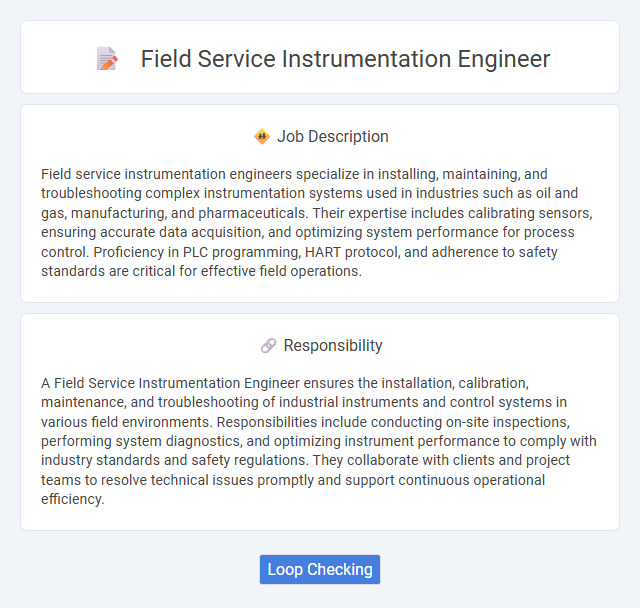
Field service instrumentation engineers specialize in installing, maintaining, and troubleshooting complex instrumentation systems used in industries such as oil and gas, manufacturing, and pharmaceuticals. Their expertise includes calibrating sensors, ensuring accurate data acquisition, and optimizing system performance for process control. Proficiency in PLC programming, HART protocol, and adherence to safety standards are critical for effective field operations.
Individuals with strong problem-solving skills and a passion for technology are likely suitable for a Field Service Instrumentation Engineer role, given its technical demands and hands-on nature. Those comfortable with frequent travel and working in various industrial environments may find the job aligns well with their lifestyle preferences. However, people who prefer routine office work or have limited adaptability might face challenges thriving in this position.
Qualification
A Field Service Instrumentation Engineer typically requires a bachelor's degree in instrumentation engineering, electrical engineering, or a related technical field. Proven expertise in installing, calibrating, troubleshooting, and maintaining industrial instruments such as pressure transmitters, flow meters, and control valves is essential. Strong knowledge of sensor technologies, control systems, and safety standards enhances job performance and career prospects in this role.
Responsibility
A Field Service Instrumentation Engineer ensures the installation, calibration, maintenance, and troubleshooting of industrial instruments and control systems in various field environments. Responsibilities include conducting on-site inspections, performing system diagnostics, and optimizing instrument performance to comply with industry standards and safety regulations. They collaborate with clients and project teams to resolve technical issues promptly and support continuous operational efficiency.
Benefit
Field service instrumentation engineers likely enjoy career benefits such as competitive salaries and opportunities for professional growth in advanced technologies. The role may offer hands-on experience with state-of-the-art instrumentation systems, enhancing technical skills and industry knowledge. Job stability and travel opportunities are probable advantages, appealing to those interested in dynamic work environments.
Challenge
Field service instrumentation engineers probably face challenges related to troubleshooting complex instrumentation systems in unpredictable environments, requiring quick problem-solving skills. They might encounter difficulties ensuring accurate calibration and maintenance of sensitive instruments under time constraints. Managing communication between cross-functional teams and adapting to evolving technologies could also be significant hurdles in this role.
Career Advancement
Field service instrumentation engineers gain expertise in installing, calibrating, and maintaining complex measurement systems across industries such as oil and gas, manufacturing, and energy. Career advancement opportunities include progressing to senior engineering roles, project management, or specialization in automation and control systems, which often lead to higher salaries and leadership responsibilities. Continuous professional development, certifications such as ISA or IEC standards, and hands-on experience with emerging technologies enhance prospects for promotion in this dynamic field.
Key Terms
Loop Checking
Field service instrumentation engineers specialize in maintaining and troubleshooting industrial control systems, with a focus on loop checking to ensure proper signal flow and instrumentation functionality. Loop checking involves verifying sensor inputs, control outputs, and final control elements are correctly wired and calibrated to optimize system performance. Mastery of loop testing procedures reduces downtime and enhances reliability in automated process control environments.
 kuljobs.com
kuljobs.com